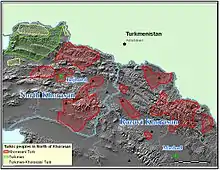| Total population | |
|---|---|
| 400,000–854,000[1][2] | |
| Regions with significant populations | |
| North Khorasan, Razavi Khorasan, Golestan | |
| Languages | |
| Khorasani Turkic and Persian | |
| Religion | |
| Shia Islam | |
| Related ethnic groups | |
| Other Turkic peoples Especially Turkmens |
Khorasani Turks (Persian: ترکهای خراسان; Khorasani Turkic: خوراسان تؤرکلری) are a Turkic ethnic group inhabiting part of North Khorasan, Razavi Khorasan and Golestan provinces of Iran, as well as in the neighboring regions of Turkmenistan up to beyond the Amu Darya River and speak Khorasani Turkic. Some can also speak Kurdish due to intermarriages with Khorasani Kurds, and they can also speak Persian as it is the lingua franca of Iran.[3]
The Khorasani Turks are not to be confused with other Turkic groups which have arrived in Khorasan more recently, especially Iranian Azerbaijanis, who had a presence in the area, especially in Mashhad, from about the early 20th century.[4]

Tribes
There are many clans and clans in Khorasan due to the arrival of Turks in different dates:
- Za'faranlu live in Shirvan and Quchan.
- Qarachordu lives mainly in Isfarayen.
- Imarli, Bukanli, Cuyanli, Pehlivanli, Boranli and Kilicanli lives mainly in Bojnord. Timurtash and Nardin lives in Gorgan city center.
- Godari lives in Sini.
- Ramiani lives in Ramian, Azadshahr and Gonbad-e Kavous counties of Golestan province.
- Hajilari lives in Minoodasht, Galikesh, Kalaleh, Gonbad-e Kavous counties of Golestan province.
- Qarai lives in Torbat-e Heydarieh.[5]
- Several other tribes include Shamlu, Qaramanlu, and Silsüpür.[6]
Notable Khorasani Turks
- Haj Ghorban Soleimani
- Haji Bektash Veli (disputed)
See also
References
- ↑ The Turkic Languages, By Lars Johanson, Éva Ágnes Csató Johanson, page 13, Routledge, 2015
- ↑ Potter, Lawrence G. (2014). Sectarian Politics in the Persian Gulf. Oxford University Press. p. 290. ISBN 978-0-19-937726-8. Retrieved 14 January 2023.
- ↑ Madih, Abbasali (2014). "Kurds, Turkish language in Nishabur" (PDF). Journal of Applied Environmental and Biological Sciences. 5 (1): 164–165. Retrieved 14 January 2023.
- ↑ "AZERBAIJAN vi. Population and its Occupations and Culture". Encyclopædia Iranica. August 18, 2011. Retrieved 13 August 2013.
- ↑ Horasan Ağızları (in Turkish) Archived 19 March 2013 at the Wayback Machine
- ↑ Aksüt, Hamza (2009). Aleviler Türkiye, İran, İrak, Suriye, Bulgaristan : araştırma-inceleme. pp. 375, 377.
Turkmen groups include tribes such as Karamanlı, Silsüpür and Şamlu.
Sources
- فصلنامه تحقیقات جغرافیایی، سال سوم شماره ۲، پاییز ۱۳۷۶، دکتر محمد حسین پاپلی یزدی
- The Khorasani Turks of Iran
- Turks of Iran
- kalafat_horasan